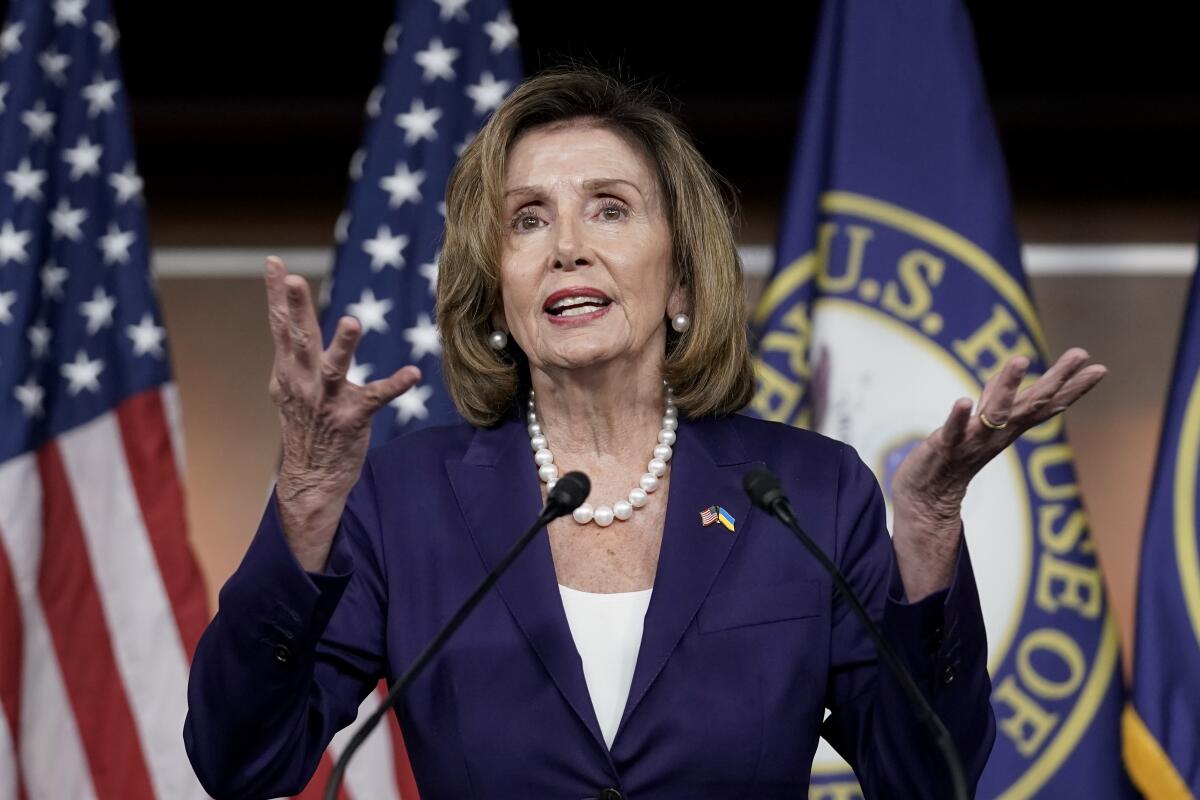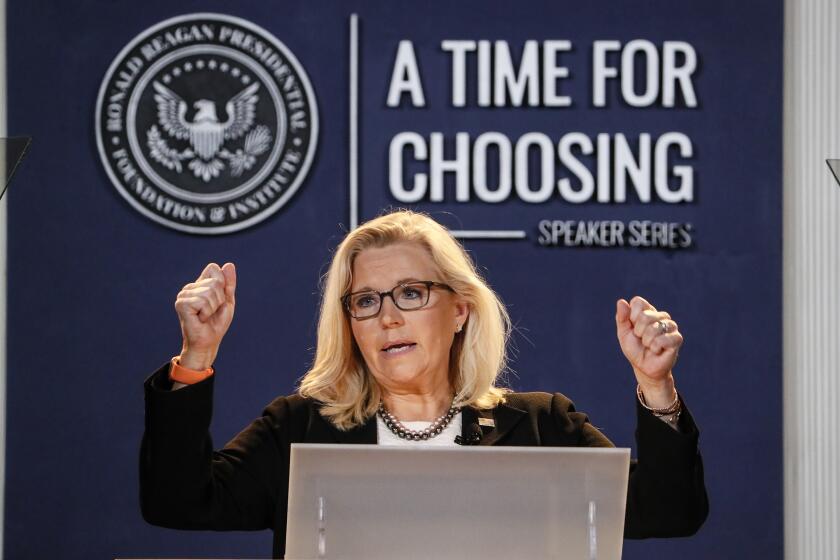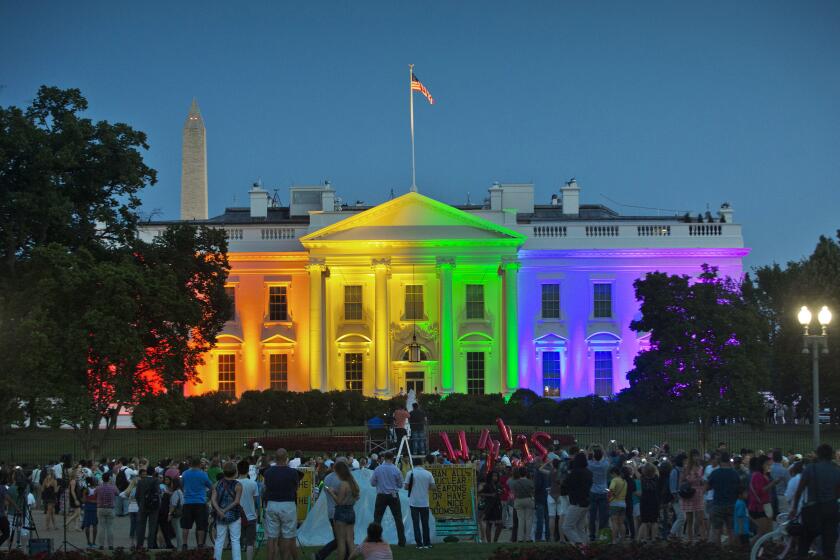House passes semiautomatic gun ban after 18-year lapse

- Share via
WASHINGTON — The House passed legislation Friday to revive a ban on semiautomatic guns, the first vote of its kind in years and a direct response to the firearms often used in the crush of mass shootings ripping through communities nationwide.
Once banned in the U.S., the high-powered firearms are now widely blamed as the weapon of choice among young men responsible for many of the most devastating mass shootings. But Congress allowed the restrictions first put in place in 1994 on the manufacture and sales of the weapons to expire a decade later, unable to muster the political support to counter the powerful gun lobby and reinstate the weapons ban.
Speaker Nancy Pelosi (D-San Francisco) pushed the vote toward passage in the Democratic-run House, saying the earlier ban “saved lives.”
The House legislation is shunned by Republicans, who dismissed it as an election-year strategy by Democrats. All but two Republicans — Reps. Brian Fitzpatrick of Pennsylvania and Chris Jacobs of New York —voted against the bill, which passed 217-213. It will likely stall in the 50-50 Senate.
The bill comes at a time of intensifying concerns about gun violence and shootings — the supermarket shooting in Buffalo, N.Y.; massacre of school children in Uvalde, Texas; and the July Fourth shootings of revelers in Highland Park, Ill.
Voters seem to be taking such election-year votes seriously as Congress splits along party lines and lawmakers are forced to go on the record with their views. A recent vote to protect same-sex marriages from potential Supreme Court legal challenges won a surprising amount of bipartisan support.
Republican Trump critic Rep. Liz Cheney of Wyoming has raised $1.2 million for her reelection campaign from Californians — including many Democrats.
President Biden, who was instrumental in helping secure the first semiautomatic weapons ban as a senator in 1994, encouraged passage, promising to sign the bill if it reached his desk. In a statement before the vote, his administration said “we know an assault weapons and large-capacity magazine ban will save lives.”
The Biden administration said for 10 years while the ban was in place, mass shootings declined. “When the ban expired in 2004, mass shootings tripled,” the statement said.
Republicans stood firmly against limits on ownership of the high-powered firearms during an at times emotional debate ahead of voting.
“It’s a gun grab, pure and simple,” said Rep. Guy Reschenthaler (R-Pa.).
Said Rep. Andrew Clyde, (R-Ga.), “An armed America is a safe and free America.”
Democrats argued that the ban on the weapons makes sense, portraying Republicans as extreme and out of step with Americans.
Proposal to protect marriage rights highlights divisions within conservative ranks.
Rep. Jim McGovern (D-Mass.) said the weapons ban is not about taking away Americans’ 2nd Amendment rights but ensuring that children also have the right “to not get shot in school.”
Pelosi displayed a poster of a gun company’s advertisement for children’s weapons, smaller versions that resemble the popular AR-15 rifles and are marketed with cartoon-like characters. “Disgusting,” she said.
The bill would make it unlawful to import, sell or manufacture a long list of semiautomatic weapons. Judiciary Committee Chairman Rep. Jerry Nadler (D-N.Y.) said it exempts those already in possession.
For nearly two decades, since the previous ban expired Democrats had been reluctant to revisit the issue and confront the gun lobby. But voter opinions appear to be shifting and Democrats dared to act before the fall elections. The outcome will provide information for voters of where the candidates stand on the issue.
Democrats had tried to link the weapons ban to a broader package of public safety measures that would have increased federal funding for law enforcement. It’s something centrist Democrats in tough reelection campaigns wanted to shield them from political attacks by their Republican opponents that they are soft on crime.
Pelosi said the House will revisit the public safety bills in August when lawmakers are expected to return briefly to Washington to handle other remaining legislation, including Biden’s priority inflation-fighting package of healthcare and climate change strategies making its way in the Senate.
The House has passed a $280-billion package to boost the semiconductor industry and scientific research in a bid to create more high-tech jobs in the United States and help it better compete with international rivals, namely China. The Senate approved the bill a day earlier.
Congress passed a modest gun violence prevention package just last month in the aftermath of the tragic shooting of 19 school children and two teachers in Uvalde. That bipartisan bill was the first of its kind after years of failed efforts to confront the gun lobby, including after a similar 2012 mass tragedy at Sandy Hook Elementary School in Newtown, Conn.
That law provides for expanded background checks on young adults buying firearms, allowing authorities to access certain juvenile records. It also closes the so-called “boyfriend loophole” by denying gun purchases for those convicted of domestic abuse outside of marriages.
The new law also frees up federal funding to the states, including for “red flag” laws that enable authorities to remove guns from those who would harm themselves or others.
But even that modest effort at halting gun violence came at time of grave uncertainty in the U.S. over restrictions on firearms as the more conservative Supreme Court is tackling gun rights and other issues.
Biden signed the measure two days after the Supreme Court’s ruling striking down a New York law that restricted people’s ability to carry concealed weapons.
More to Read
Sign up for Essential California
The most important California stories and recommendations in your inbox every morning.
You may occasionally receive promotional content from the Los Angeles Times.













